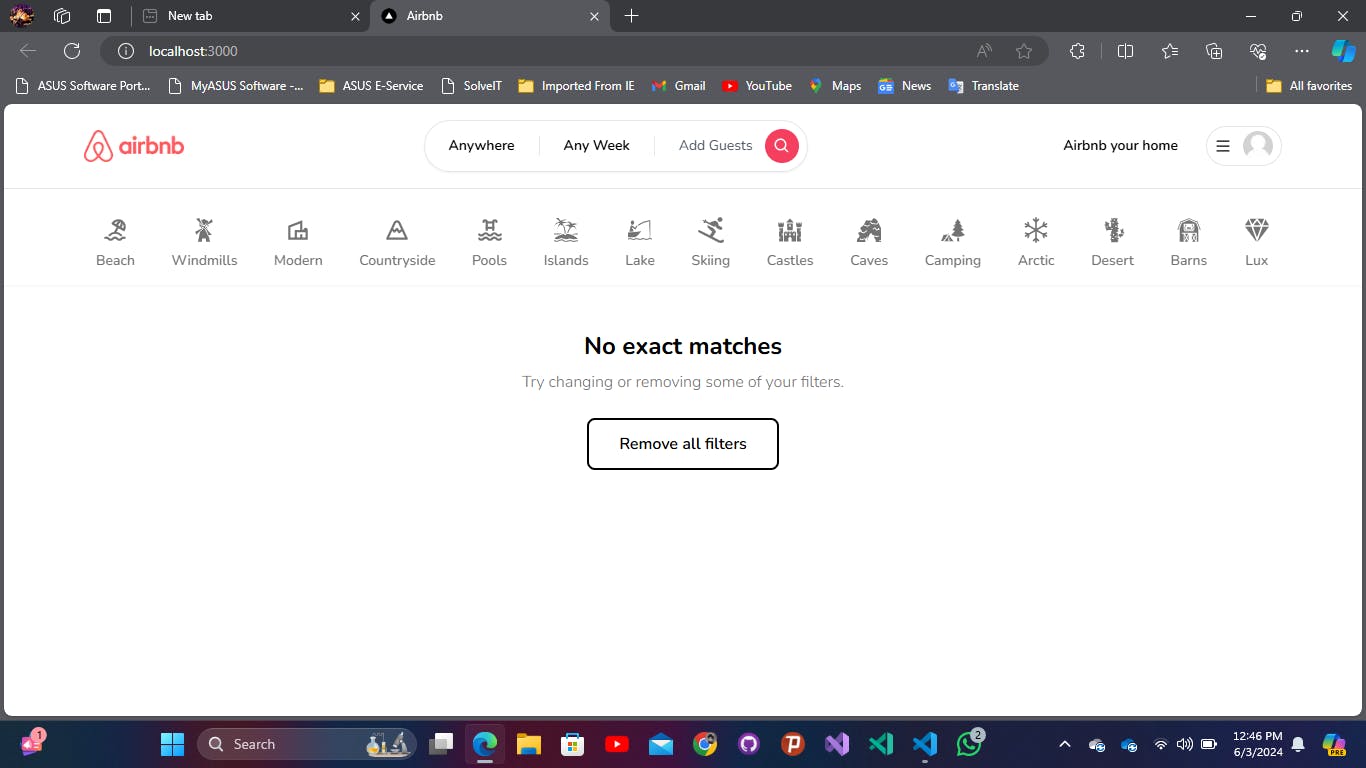Booking App (Airbnb)
Friday, May 24, 2024

Building an Airbnb Clone: Overcoming Challenges and Key Learnings
Embarking on the journey to build an Airbnb clone is an ambitious and rewarding endeavor that provides deep insights into full-stack development. This blog chronicles my experiences, the challenges faced, and the lessons learned throughout the process of creating a functional Airbnb-like application.
Why Build an Airbnb Clone?
Creating an Airbnb clone was driven by several motivations:
Mastering Full-Stack Development: The project involves both backend and frontend development, offering comprehensive learning.
Solving Real-World Problems: Replicating the complex functionalities of Airbnb enhances problem-solving skills.
Building a Portfolio: A robust, functional clone of a well-known application is a significant portfolio addition, demonstrating practical skills.
Development Goals
User Authentication: Secure login, signup, and account management.
Property Listings: Users can list properties with details and photos.
Search and Filters: Implement search functionality with location, price, and amenities filters.
Booking System: Enable users to book properties and manage reservations.
Reviews and Ratings: Allow users to leave reviews and rate properties.
Responsive Design: Ensure the app works seamlessly on both web and mobile devices.
The Development Journey
Backend Development
Database Design: Designing schemas for users, properties, bookings, and reviews. This was crucial for managing relationships between entities and ensuring data integrity.
User Authentication: Implementing secure authentication with JWT and OAuth. This highlighted the importance of user data security.
Property Listings: Building CRUD (Create, Read, Update, Delete) operations for property listings. This helped me understand data handling and storage.
Booking System: Developing a booking mechanism required careful handling of dates and availability to prevent double bookings.
Frontend Development
User Interface Design: Using frameworks like React for a responsive, interactive UI. This enhanced my skills in component-based architecture.
Search and Filters: Implementing dynamic search and filter functionalities. This improved my understanding of state management and real-time data updates.
Reviews and Ratings: Creating a system for users to leave reviews and ratings involved working with form handling and validation.
Responsive Design: Ensuring the application was mobile-friendly taught me about responsive design principles and CSS frameworks like Bootstrap.
Challenges Faced
Complex Integrations: Integrating third-party services such as Google Maps for location-based searches and Stripe for payment processing was challenging but rewarding.
Data Security: Ensuring the security of user data required implementing best practices in encryption and secure authentication methods.
User Experience: Designing an intuitive user interface that provides a seamless experience was more complex than anticipated but crucial for user satisfaction.
Scalability: Planning for future growth and ensuring the application can handle an increasing number of users and data was a critical aspect.
;Time Management
Balancing this project with other commitments required effective time management:
Setting Clear Milestones: Breaking down the project into manageable tasks with specific goals helped maintain focus and progress.
Consistent Work Schedule: Allocating regular time slots for development ensured steady progress and helped manage workload.
Prioritizing Tasks: Focusing on high-priority tasks first ensured that essential functionalities were implemented early in the development process.
Key Learnings
Problem-Solving Skills: Tackling complex issues and finding solutions enhanced my technical and critical thinking abilities.
Security Best Practices: Implementing secure authentication and data protection methods provided a deep understanding of security principles.
User Experience Design: Designing an intuitive and responsive UI taught me the importance of user-centered design principles.
Scalability Planning: Ensuring the app could handle growth required learning about database optimization and caching mechanisms.
Effective Time Management: Balancing development with other responsibilities underscored the importance of setting clear goals and maintaining a consistent work schedule.
Conclusion
Building an Airbnb clone has been a challenging yet immensely rewarding journey. It has provided a comprehensive understanding of full-stack development and taught valuable lessons in problem-solving, security, user experience, and time management. Despite the hurdles, the experience has been highly educational and fulfilling, significantly enhancing my development skills and confidence. This project stands as a testament to the power of perseverance and the joy of creating a functional and meaningful application.
;